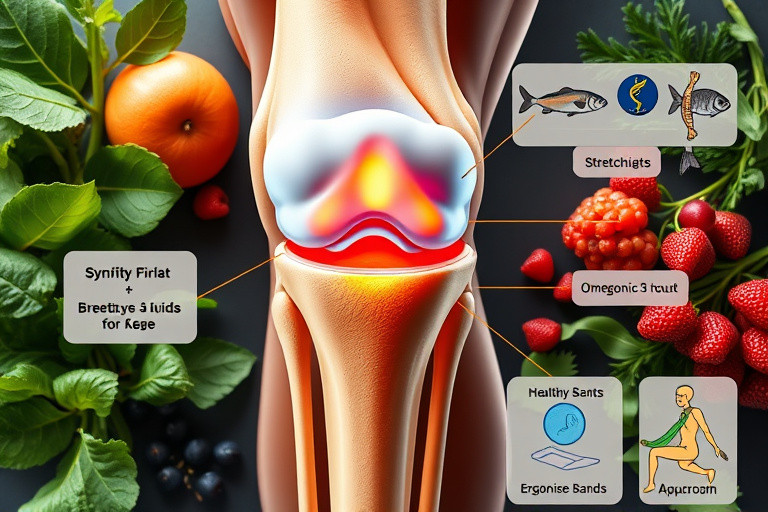Understanding the Foundations of Joint Health: Key Factors Influencing Joint Function
Joints are complex structures that facilitate movement and bear weight, comprising bones, cartilage, synovial fluid, ligaments, and connective tissue. Common causes of joint pain include osteoarthritis, rheumatoid arthritis, injuries, and overuse. As we age, cartilage tends to wear down, and synovial fluid production decreases, leading to stiffness and discomfort. Lifestyle factors such as physical activity levels, diet, and injury history significantly influence joint health. Maintaining the integrity of cartilage, ensuring adequate synovial fluid, and supporting connective tissue are essential for optimal joint function and mobility.
Evidence-Based Approaches to Manage and Reduce Joint Pain and Stiffness
Diet plays a crucial role in managing joint discomfort. Anti-inflammatory foods—such as fatty fish rich in omega-3s, berries, leafy greens, and nuts—can help reduce inflammation and alleviate pain. Targeted physical activity, especially low-impact exercises like swimming, cycling, and walking, strengthens muscles around joints, providing better support and reducing stiffness. Additionally, physiotherapy and specific stretching routines tailored to individual needs can improve flexibility and joint function, making daily movements more comfortable.
Strategies to Prevent Joint Degeneration and Slow Cartilage Wear
Preventing joint degeneration involves maintaining a healthy weight to minimize unnecessary stress on weight-bearing joints. Incorporating joint-protective habits, such as using ergonomic tools and practicing proper posture, reduces strain during daily activities. Early intervention is vital; addressing joint issues promptly with appropriate treatment can slow the progression of osteoarthritis and preserve joint health over time. Regular check-ups with healthcare professionals can help identify early signs of joint wear and facilitate timely management.
Supporting Joint Flexibility and Mobility for Active Living
Consistent stretching and mobility exercises enhance the range of motion and prevent stiffness. Strength training, focusing on muscles supporting the joints, improves stability and reduces the risk of injury. For aging populations, techniques like balance and proprioception training are effective in maintaining mobility and preventing falls. Incorporating these practices into daily routines supports long-term joint health and enables continued active living.
Evidence-Based Nutritional Supplements for Supporting Joint Health
Supplements such as glucosamine and chondroitin have been extensively studied for their potential to support cartilage repair and reduce joint pain. Omega-3 fatty acids, found in fish oil, are known for their anti-inflammatory properties and may help decrease joint inflammation. Other nutrients like vitamin D and collagen are also linked to joint support; vitamin D aids in calcium absorption and bone health, while collagen provides the building blocks for cartilage regeneration. Consulting with a healthcare provider can help determine the most appropriate supplement regimen.
Lifestyle and Environmental Factors That Promote Long-Term Joint Wellness
Avoiding repetitive joint stress and injuries is fundamental to preserving joint health. Incorporating mindfulness and stress reduction techniques can positively influence overall joint function by lowering inflammation levels. Regular medical check-ups facilitate early detection of joint issues, allowing for timely interventions. Creating a lifestyle that emphasizes balanced activity, proper ergonomics, and stress management contributes significantly to long-term joint wellness.
What Research Tells Us About Emerging Treatments and Therapies
Recent advances in regenerative medicine, including stem cell therapy, show promise in repairing damaged joint tissues. Minimally invasive treatments, such as joint injections with hyaluronic acid or platelet-rich plasma (PRP), are increasingly used to reduce pain and promote healing. The future of joint health management is moving toward personalized approaches, considering genetic predispositions and lifestyle factors to tailor treatments effectively. Ongoing research continues to explore innovative solutions aimed at restoring joint function and delaying degeneration.
Final Thoughts: Building a Sustainable Plan for Longevity in Joint Health
Maintaining healthy joints requires a combination of evidence-based strategies, proactive lifestyle choices, and early intervention. Incorporating nutritious foods, regular physical activity, appropriate supplementation, and ergonomic habits can significantly improve joint longevity. By staying informed about emerging treatments and adopting habits that support joint health, individuals can enhance their quality of life and sustain mobility well into older age. For those interested in understanding the underlying causes of joint issues and exploring targeted solutions, Joint Genesis offers valuable insights into joint health optimization.




